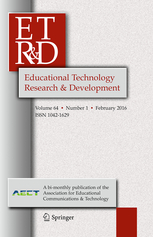Pedagogical agents as learning companions: The role of agent competency and type of interaction
This study was designed to examine the effects of the competency (low vs. high) and interaction type (proactive vs. responsive) of pedagogical agents as learning companions (PALs) on learning, self-efficacy, and attitudes. Participants were 72 undergraduates in an introductory computer-literacy course who were randomly assigned to one of four treatments: Low-Proactive, Low-Responsive, High-Proactive, and High-Responsive. Results indicated a main effect for PAL competency. Students who worked with the high-competency PAL in both proactive and responsive conditions achieved higher scores in applying what they had learned and showed more positive attitudes toward the PAL. However, students who worked with the low-competency PAL reported significantly enhanced self-efficacy beliefs in the learning tasks. Also, there was a main effect for PAL interaction type. A proactive PAL had a significantly positive impact on recall. These different results on learning
and motivational outcomes suggest that the competency and interaction type of a PAL should be designed according to the desired learning and motivational goals.

